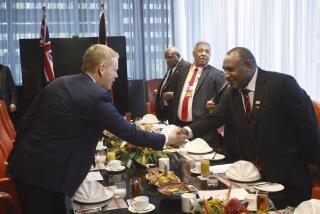A Pledge to Fight Terrorism
CABO SAN LUCAS, Mexico — Calling terrorism a threat to free trade, Pacific Rim leaders pledged Sunday to introduce by 2005 tighter, high-tech monitoring of cargo and passengers moving across their borders and to reinforce cockpit doors on their airliners by next April.
The commitments, expected to cost tens of millions of dollars, marked an advance in the U.S.-led war on terrorism. The Bush administration pushed for their adoption by the Asia-Pacific Economic Cooperation forum, or APEC, whose 21 members account for nearly half of all international trade and contain most of the world’s busiest seaports and airports.
President Bush also left APEC’s two-day gathering here with backing from its members for a demand that North Korea give up its recently disclosed effort to build nuclear weapons.
Though his agenda dominated the talks at this Baja California beach resort, Bush achieved only mixed success. Japan and South Korea persuaded him to forsake an outright condemnation of North Korea, arguing that one would be counterproductive. And Bush failed to gain support here for a U.S.-sponsored proposal in the United Nations on using force against Iraq.
APEC was formed 13 years ago to promote free trade, but security issues have taken over its last two annual gatherings. Last year’s came weeks after the Sept. 11 hijackings; this year’s followed terrorist attacks in Bali and the Philippines and unfolded during the deadly siege of a Moscow theater by Chechen separatists.
“Terrorism can come from anywhere,” Canadian Prime Minister Jean Chretien said Sunday, emphasizing the sense of vulnerability that drove the discussions here.
The group’s members are Australia, Brunei, Canada, Chile, China, Hong Kong, Indonesia, Japan, Malaysia, Mexico, New Zealand, Papua New Guinea, Peru, the Philippines, Russia, Singapore, South Korea, Taiwan, Thailand, the United States and Vietnam.
Many of the security measures agreed to Sunday are already being put into effect in the United States, Japan, Canada and Western Europe. A number of Asian leaders voiced concern here that a wider application would be expensive, undermine trade and slow economic growth.
But some countries with busy ports, such as Singapore, argued that they would lose cargo traffic unless they became more security-conscious. Eventually, a consensus emerged that security today is simply another business cost that cannot be avoided. The U.S. and other wealthier countries agreed to help the poorer ones pay for the new measures.
APEC nations pledged to require by 2005 electronic identity beacons on ships using their ports. They also agreed, by that year, to introduce electronic systems to screen baggage at airports and enable customs inspectors to quickly identify high-risk shipments.
And they pledged to act “expeditiously” to require electronic seals on international cargo containers and to exchange passenger lists ahead of the arrivals of aircraft and ships.
To suppress the financing of terrorism, the leaders vowed to promote better monitoring of charities, nonprofit groups and money-transfer systems such as the ancient Middle Eastern honor-based hawala, believed to have been used by Al Qaeda and the Sept. 11 hijackers.
The steps outlined Sunday are voluntary, and officials acknowledged that some deadlines are extremely ambitious.
Next April’s deadline for reinforced cockpit doors will be met “wherever possible,” according to the APEC leaders’ statement. Officials explained that the bulletproof doors, which cost about $30,000 apiece, might be ready for international flights but not all domestic ones.
In another step forward for the U.S.-led campaign, Malaysia announced this weekend that it would set up a regional anti-terrorist center so that U.S. security specialists can train their counterparts in Southeast Asia.
“Globalization has turned the world into an interconnected village, a village where, if a house burns, no one is safe,” said Abdullah Ahmad Badawi, Malaysia’s deputy prime minister.
*
Times staff writer Maura Reynolds contributed to this report.
More to Read
Sign up for Essential California
The most important California stories and recommendations in your inbox every morning.
You may occasionally receive promotional content from the Los Angeles Times.










